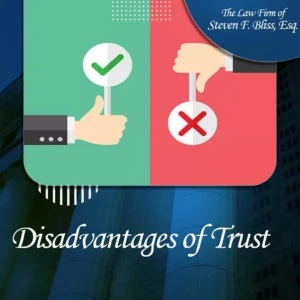In California, a revocable living trust is one of the most effective tools for estate planning. It allows individuals to maintain control over their assets during life while ensuring that those assets are distributed efficiently upon death. Unlike a will, a living trust avoids probate, providing families with both financial and emotional relief during an already difficult time. Its flexibility and efficiency make it an essential strategy for many Californians.
 One of the primary advantages of a revocable living trust is probate avoidance. Probate in California can be expensive, time-consuming, and public. By placing assets into a living trust, families bypass the probate court process, allowing heirs to receive their inheritances faster and without the high statutory fees that come with probate. This is particularly important in California, where property values often push estates above the probate threshold.
One of the primary advantages of a revocable living trust is probate avoidance. Probate in California can be expensive, time-consuming, and public. By placing assets into a living trust, families bypass the probate court process, allowing heirs to receive their inheritances faster and without the high statutory fees that come with probate. This is particularly important in California, where property values often push estates above the probate threshold.
Another benefit is privacy. Probate proceedings are public records, meaning anyone can access details about the estate, its value, and its beneficiaries. A revocable living trust, however, is a private document. Only the trustee and beneficiaries need to know its contents, keeping family matters confidential and protecting heirs from unwanted attention.
A living trust also provides seamless management of assets in case of incapacity. If the grantor becomes unable to handle their financial affairs, the successor trustee can step in without the need for a court-ordered conservatorship. This ensures that bills are paid, investments are managed, and property is maintained, all without court interference. For Californians concerned about future incapacity, this is a crucial advantage.
| Advantage | Benefit | California Impact |
|---|---|---|
| Probate Avoidance | Saves time and money | Bypasses lengthy probate process |
| Privacy | Keeps estate details confidential | Not part of public record |
| Incapacity Planning | Successor trustee manages assets | Avoids costly conservatorship |
| Flexibility | Can be amended or revoked anytime | Adaptable to life changes |
| Faster Distribution | Assets transferred without delays | Beneficiaries receive assets quicker |
Flexibility is another hallmark of a revocable living trust. Unlike irrevocable trusts, a revocable trust can be changed or revoked at any time during the grantor’s lifetime. This means it can evolve with life events such as marriage, divorce, the birth of children, or changes in financial circumstances. Californians can rest assured that their estate plan remains adaptable to their needs.
Finally, a revocable living trust often results in smoother estate administration. Successor trustees can manage distributions without direct court supervision, reducing delays and potential disputes. Beneficiaries gain quicker access to assets, which can be especially helpful for covering immediate expenses like mortgages, tuition, or medical bills.
In conclusion, the advantages of a revocable living trust in California include avoiding probate, maintaining privacy, planning for incapacity, preserving flexibility, and expediting asset distribution. For families seeking to protect wealth, reduce stress, and ensure wishes are honored, a revocable living trust offers a comprehensive and practical solution that aligns with California’s legal framework.






